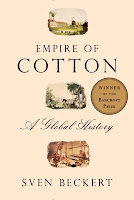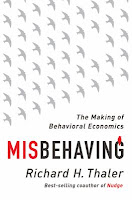Books to Get You Thinking
As 2015 gradually recedes into history, it is a good time to take stock of the many excellent books published all through the year. Covering a wide range of genres and subjects, the outstanding books of 2015 will stay on our book shelves long after other memories fade away. In December each year, leading newspapers and journals share with readers their top picks of books published. This month we highlight a select group of titles from The Best Books of 2015 lists that have appeared in newspapers recently - all titles can be found at the Mercer County Library System!
New York Times
Invention of Nature: Alexander von Humboldt’s New World by Andrea Wulf
The great polymath, Alexander Von Humboldt was one of the most prominent figures of the late eighteenth and early nineteenth centuries. In this extensively researched biography, Andrea Wulf brings to focus the amazing life of Alexander von Humboldt. She describes in vivid detail his exciting expeditions, travels and exploits, and highlights the lasting influence his work has had on academics and on the evolution of scientific thought. He travelled extensively, exploring the jungles of South America and the steppes in Russia, picking up thousands of specimens of plants. He also identified the Equator and went on to discover isotherms. It was Humboldt who first perceived the world and space as one interconnected whole and predicted that deforestation, and human action, had the potential of destroying it.
Empire of Cotton: A Global History by Sven Beckert
This fascinating book highlights the central role played by the cotton industry in bringing about the Industrial Revolution and subsequent rise and growth of capitalism in the nineteenth century. Using a host of primary and secondary sources, Sven Beckert, a professor at Harvard, pens a rich and diverse history of the global cotton textile industry as far back as the Bronze Age. Most importantly, the book draws attention to the violence behind the growth of this industry - not only in the slave plantations of the Southern states but also in Asia, the Middle East and South America, where local subsistence agriculture was displaced by commercial production. Governments, too, played an important role by financing investments, infrastructure and controlling tariffs and duties to provide a viable environment for growth. In more recent times, the search for cheap labor has sent the industry back to Asia where child labor and low wages continue to dominate the oppressive nature of the industry.
Washington Post
Do No Harm: Stories of Life, Death, and Brain Surgery by Henry Marsh
Henry Marsh authors this compelling memoir in which he reflects on a lifetime of experience as an eminent neurosurgeon in London. Marsh describes in detail his typical day as a practicing neurosurgeon, sharing with readers his many triumphs as well as his innermost thoughts as he performed surgeries looking down at the brain - "the mysterious substrate of all thought and feeling, of all that was most important in life". He chronicles the unparalleled feeling of elation that followed a successful surgery, knowing he had saved a life but, inevitably, also the many instances of complications and mistakes that would stay to haunt him. At the end of his long career as a neurosurgeon, Marsh reflects on the somber truth that a doctor learns through mistakes. One of the interesting parts of the book deals with Marsh’s experiences in Ukraine where he helped perform much needed surgeries on patients in a resource-constrained environment.
Financial Times
Misbehaving: The Making of Behavioral Economics by Richard Thaler
Richard Thaler, an economics professor from Chicago’s Booth School of Business, provides a lucid analysis of the core concepts of behavioral economics in this engrossing book. This branch of economics grew in response to real world observations that frequently deviate from predictions and analysis made by traditional economics, grounded on the simplifying assumption of people always making decisions to optimize value. In reality, economic outcomes are more often a result of complex human decision making. By integrating experiments and randomized control trials, as well as psychology and other disciplines into the analysis, modern behavioral economics brings theory closer to reality. It is able to predict more accurately how human beings would behave under different scenarios in the real world in contrast to the efficient market hypothesis provided by the principles of equilibrium and optimization in traditional economic theory.
Wall Street Journal
Mourning Lincoln by Martha Hodes
Martha Rhodes, a professor at NYU, presents a compelling portrait of a nation in the days that followed the 1865 assassination of Abraham Lincoln, America’s 16th President. The book is based on extensive research involving hundreds of letters, diaries and other sources, disclosing personal responses that portray the reaction of everyday Americans to Lincoln’s assassination. The author specifically explores the depth of emotion felt by the African-American people who, in Lincoln’s death, lost a savior and martyr to their cause. In a speech made to New Yorkers in 1865, Frederick Douglass noted that Lincoln "was the first American President who . . . rose above the prejudice of his times, and country." However, contrary to the notion of a country unified in its grief at Lincoln’s death, the book reveals a deep divide not just between the North and the South, but all across the nation.
New York Times
Invention of Nature: Alexander von Humboldt’s New World by Andrea Wulf
The great polymath, Alexander Von Humboldt was one of the most prominent figures of the late eighteenth and early nineteenth centuries. In this extensively researched biography, Andrea Wulf brings to focus the amazing life of Alexander von Humboldt. She describes in vivid detail his exciting expeditions, travels and exploits, and highlights the lasting influence his work has had on academics and on the evolution of scientific thought. He travelled extensively, exploring the jungles of South America and the steppes in Russia, picking up thousands of specimens of plants. He also identified the Equator and went on to discover isotherms. It was Humboldt who first perceived the world and space as one interconnected whole and predicted that deforestation, and human action, had the potential of destroying it.
Empire of Cotton: A Global History by Sven Beckert
This fascinating book highlights the central role played by the cotton industry in bringing about the Industrial Revolution and subsequent rise and growth of capitalism in the nineteenth century. Using a host of primary and secondary sources, Sven Beckert, a professor at Harvard, pens a rich and diverse history of the global cotton textile industry as far back as the Bronze Age. Most importantly, the book draws attention to the violence behind the growth of this industry - not only in the slave plantations of the Southern states but also in Asia, the Middle East and South America, where local subsistence agriculture was displaced by commercial production. Governments, too, played an important role by financing investments, infrastructure and controlling tariffs and duties to provide a viable environment for growth. In more recent times, the search for cheap labor has sent the industry back to Asia where child labor and low wages continue to dominate the oppressive nature of the industry.
Washington Post
Do No Harm: Stories of Life, Death, and Brain Surgery by Henry Marsh
Henry Marsh authors this compelling memoir in which he reflects on a lifetime of experience as an eminent neurosurgeon in London. Marsh describes in detail his typical day as a practicing neurosurgeon, sharing with readers his many triumphs as well as his innermost thoughts as he performed surgeries looking down at the brain - "the mysterious substrate of all thought and feeling, of all that was most important in life". He chronicles the unparalleled feeling of elation that followed a successful surgery, knowing he had saved a life but, inevitably, also the many instances of complications and mistakes that would stay to haunt him. At the end of his long career as a neurosurgeon, Marsh reflects on the somber truth that a doctor learns through mistakes. One of the interesting parts of the book deals with Marsh’s experiences in Ukraine where he helped perform much needed surgeries on patients in a resource-constrained environment.
Financial Times
Misbehaving: The Making of Behavioral Economics by Richard Thaler
Richard Thaler, an economics professor from Chicago’s Booth School of Business, provides a lucid analysis of the core concepts of behavioral economics in this engrossing book. This branch of economics grew in response to real world observations that frequently deviate from predictions and analysis made by traditional economics, grounded on the simplifying assumption of people always making decisions to optimize value. In reality, economic outcomes are more often a result of complex human decision making. By integrating experiments and randomized control trials, as well as psychology and other disciplines into the analysis, modern behavioral economics brings theory closer to reality. It is able to predict more accurately how human beings would behave under different scenarios in the real world in contrast to the efficient market hypothesis provided by the principles of equilibrium and optimization in traditional economic theory.
Wall Street Journal
Mourning Lincoln by Martha Hodes
Martha Rhodes, a professor at NYU, presents a compelling portrait of a nation in the days that followed the 1865 assassination of Abraham Lincoln, America’s 16th President. The book is based on extensive research involving hundreds of letters, diaries and other sources, disclosing personal responses that portray the reaction of everyday Americans to Lincoln’s assassination. The author specifically explores the depth of emotion felt by the African-American people who, in Lincoln’s death, lost a savior and martyr to their cause. In a speech made to New Yorkers in 1865, Frederick Douglass noted that Lincoln "was the first American President who . . . rose above the prejudice of his times, and country." However, contrary to the notion of a country unified in its grief at Lincoln’s death, the book reveals a deep divide not just between the North and the South, but all across the nation.
-Nita Mathur





Comments
Post a Comment